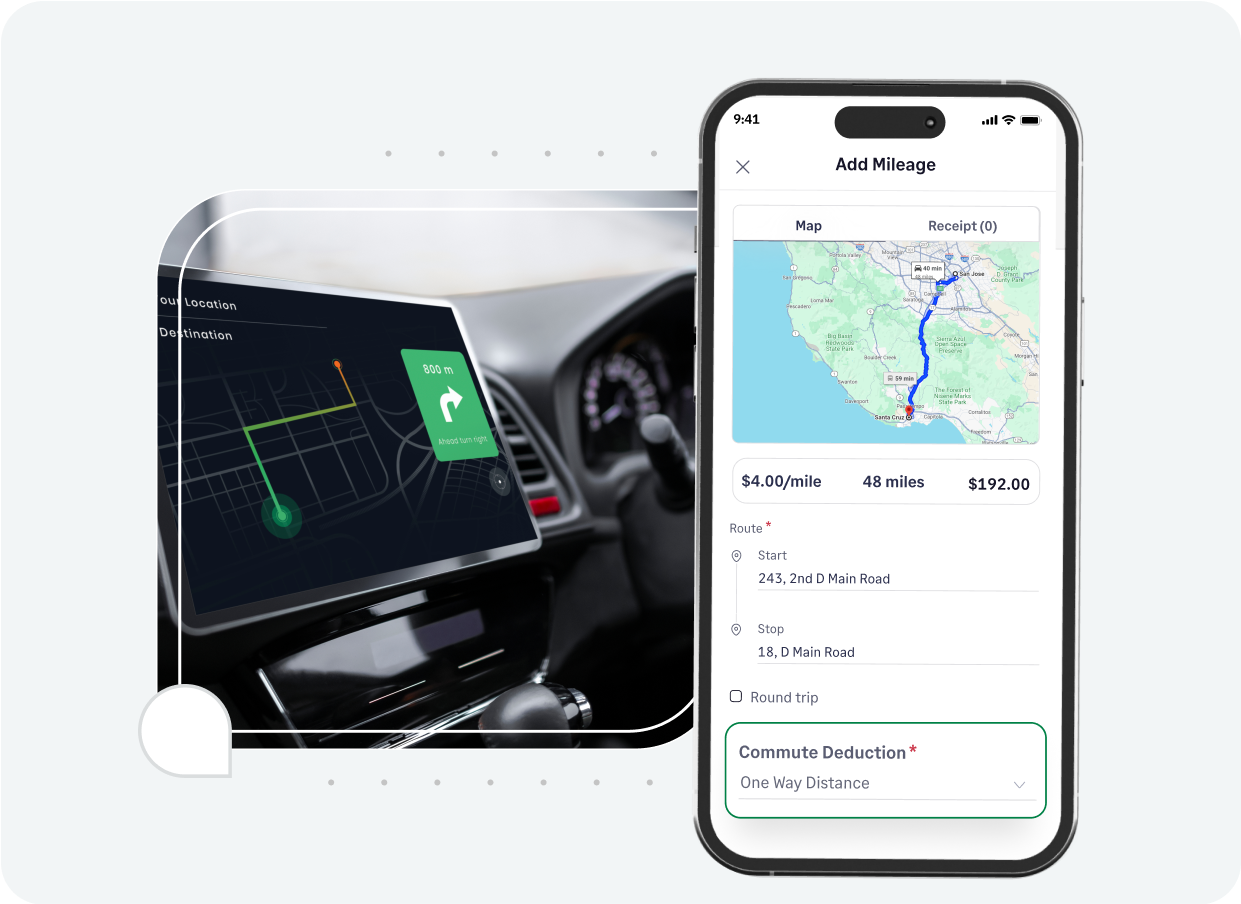In Oklahoma, understanding mileage reimbursement involves looking at federal guidelines, specific state rules for public employees and workers' compensation, and common practices among private employers.
For businesses and employees in Oklahoma, knowing these rates and rules is crucial for ensuring fair compensation and maintaining compliance.
The most widely recognized standard for business mileage reimbursement is the rate established annually by the Internal Revenue Service (IRS). For the year 2025, the IRS has set the standard mileage rate for business use at 70 cents per mile. This rate was 67 cents per mile in 2024.
While private employers in Oklahoma are not generally mandated by a specific state law to use the IRS rate for all business-related mileage, many choose this standard because:
- It provides a clear and accepted benchmark for reimbursement.
- Reimbursements made under an accountable plan at or below the IRS rate are typically non-taxable for employees and tax-deductible for employers.
As of January 1, 2025, the key IRS standard mileage rates are:
- 70 cents per mile for business use of a vehicle.
- 21 cents per mile for medical or moving purposes (note: the deduction for moving expenses is currently limited to active-duty members of the U.S. Armed Forces).
- 14 cents per mile driven in service of charitable organizations.
Other relevant rates in Oklahoma include:
- Oklahoma State Employee Rate: The State of Oklahoma, under the State Travel Reimbursement Act (74 O.S. Supp. 2023, § 500.4), sets the reimbursement rate for state employees using personal vehicles for official business. This rate is aligned with the current IRS standard business rate. Therefore, for 2025, the rate is 70 cents per mile.
- Workers' Compensation Medical Travel: Oklahoma law (Title 85A, Administrative Workers' Compensation Act) requires employers to reimburse injured employees for reasonable travel expenses to obtain necessary medical treatment for work-related injuries. The mileage reimbursement rate for this purpose is the same as the rate allowed for state employees, meaning it is 70 cents per mile for 2025.
For historical context, here are the IRS standard business mileage rates from recent years:
Oklahoma Mileage Reimbursement Calculator
Simplify your mileage reimbursement calculations with our user-friendly Oklahoma Mileage Reimbursement Calculator.
How to Use the Calculator:
- Select the correct tax year: Choose the year for which you're calculating reimbursement (e.g., 2025, 2024), as the applicable IRS rates can change.
- Input your business miles: Enter the total number of miles driven for business purposes using your personal vehicle.
- Calculate your reimbursement: The calculator will automatically apply the official IRS standard mileage rate for the selected year and display your estimated reimbursement amount.
This tool provides a quick and accurate estimate, beneficial for both employees needing to claim expenses and employers processing those claims.
Calculate
Results
Some Important Oklahoma Mileage Reimbursement Laws
While Oklahoma doesn't have a statewide law mandating mileage reimbursement for all private-sector employees in every instance, several state laws and federal regulations influence how employers should handle these expenses:
1. Oklahoma Minimum Wage Act (Title 40, Oklahoma Statutes)
Oklahoma's primary minimum wage is $7.25 per hour for employers with ten or more full-time employees or with annual gross sales over $100,000. Most employers are also subject to the federal minimum wage of $7.25 per hour.
A critical point is that any unreimbursed business expenses an employee is required to incur, such as mileage for using a personal vehicle for work, should not cause their effective hourly earnings to fall below this applicable minimum wage threshold. I
f it does, the employer could be in violation of Oklahoma and/or federal wage laws.
2. Workers' Compensation (Title 85A, Oklahoma Statutes)
Oklahoma law ensures that employees injured on the job receive reimbursement for necessary travel to obtain medical treatment.
The mileage rate for this is tied to the state employee travel reimbursement rate, which aligns with the IRS standard business rate (70 cents per mile for 2025).
3. No General Mandate for Private Employers
Oklahoma law does not specifically obligate private employers to offer mileage reimbursement for general business use of personal vehicles. Therefore, a company's internal policy plays a significant role.
However, many employers choose to reimburse as a good business practice and to avoid potential minimum wage complications.
4. State Travel Reimbursement Act (74 O.S. § 500.1 et seq.)
This act governs how state officers and employees are reimbursed for travel expenses, including mileage.
It mandates that the state mileage rate align with the IRS standard rate, ensuring state employees are reimbursed at a nationally recognized level.
Oklahoma Mileage Reimbursement Law vs. Federal Law
Understanding the interplay between Oklahoma's state context and federal laws is essential for proper mileage reimbursement:
Federal Law (FLSA)
The Fair Labor Standards Act (FLSA) is the primary federal law affecting this area. It mandates that employees receive at least the federal minimum wage ($7.25 per hour) "free and clear" of any business expenses incurred primarily for the employer's benefit.
If an Oklahoma employee's unreimbursed mileage costs effectively reduce their pay below this federal threshold, the employer must provide sufficient reimbursement to meet the minimum wage.
Since Oklahoma's primary minimum wage is the same as the federal rate, compliance with one generally ensures compliance with the other.
Oklahoma State Law
- Oklahoma's Minimum Wage Act establishes a rate of $7.25 per hour for most employers.
- Specific provisions mandate mileage reimbursement for travel related to workers' compensation medical treatment, aligning with the IRS rate.
- The State Travel Reimbursement Act also aligns the reimbursement rate for state employees with the IRS standard rate.
IRS Regulations
The IRS sets the standard mileage rates (e.g., 70 cents/mile for business in 2025) for tax purposes.
These rates are not legal mandates for employers to reimburse but are crucial for determining the non-taxable amount of reimbursement under an accountable plan.
Using these rates helps ensure that reimbursements aren't considered taxable income for employees and are deductible for employers.
In Oklahoma, federal and state minimum wage laws provide a foundational wage floor. State law aligns both workers' compensation and state employee travel reimbursement with the IRS standard rates. IRS guidelines offer a practical framework for the amount and tax treatment of reimbursements, commonly adopted by Oklahoma employers.
How Sage Expense Management (formerly Fyle) Can Automate Mileage Tracking
Simplify your mileage reimbursement and say goodbye to manual logs. Sage Expense Management offers Oklahoma businesses an efficient, automated way to manage travel expenses.
- Precise GPS mileage capture: Uses Google Maps to accurately log distances, ensuring correct reimbursement.
- Flexible rate setup: Configure IRS, state, or custom mileage rates that apply automatically.
- Easy commute deductions: Manage non-reimbursable commute travel by defining home and work locations.
- Automated recurring claims: Set up frequent trips once for automatic claim creation, saving time.
- Built-in policy enforcement: Embed your company's rules to flag non-compliant claims instantly.
- Seamless accounting sync: Integrates with QuickBooks, Xero, NetSuite, and more for error-free data transfer.
- Fast ACH reimbursements (US only): Quickly pay approved mileage claims directly to employees.
With Sage Expense Management, Oklahoma companies can improve efficiency, ensure compliance, and simplify mileage tracking for everyone.


































